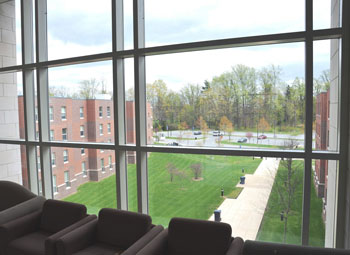- Posted in All University
- Category: Campus News

Lincoln University, PA — January marks the 15th National Stalking Awareness Month, an annual call to action to recognize and respond to the serious crime of stalking.
Stalking is defined as a pattern of behavior directed at a specific person that causes fear. According to the Centers for Disease Control, many stalking victims experience being followed, approached, monitored, and/or threatened in person and through various forms of technology2.

Lincoln University Apartment Style Living
“It is critical to raise the issue of stalking as its own form of gender-based violence as well as a crime that frequently predicts and co-occurs with physical and sexual assault,” said Tiphane’ Purnell, Lincoln’s sexual assault coordinator.
Stalking impacts over 1 in 6 women and 1 in 17 men in the United States1. Despite these numbers, many victims and criminal justice professionals underestimate its danger and urgency.
Victims often suffer from anxiety, social dysfunction, and severe depression as a result of their victimization, causing many to lose time from work and some to relocate 3,4.
Stalking is a crime in all 50 states, the U.S. Territories, and the District of Columbia, but can be difficult to recognize and prosecute in a system designed to respond to singular incidents rather than the series of acts that constitutes stalking. Stalking preceded 85% of all attempted murder cases between couples5.
NSAM’s theme —“Stalking: Know It. Name It. Stop It.” – is a call to action for everyone in the Lincoln University of PA community and across the country.
“While police and victim-serving professionals are critical, the reality is that the vast majority of victims tell friends or family about the stalking first,” said Purnell. “We all have a role to play in identifying stalking, intervening when necessary, and supporting victims and survivors to protect the LU pride.”
Lincoln’s Sexual Violence, Prevention and Education program will offer two webinars and community outreach events in the first year residence halls. The program will also engage the entire University community through various outlets throughout the month to promote awareness and public education about stalking.
Please join the Sexual Violence, Prevention and Education program in making this banner part of your signature or social media banner for the month of January. For more information, please contact Tiphane` Purnell.
For additional resources to help promote National Stalking Awareness Month, please visit www.stalkingawareness.org and www.ovw.usdoj.gov. The Sexual Violence, Prevention and Education program is located on the 2nd floor of Thurgood Marshall Living Learning Center room C212.
Sources:
1. Smith, S.G., Zhang, X., Basile, K.C., Merrick, M.T., Wang, J., Kresnow, M., Chen, J. (2018). The National Intimate Partner and Sexual Violence Survey (NISVS): 2015 Data Brief. Atlanta, GA: National Center for Injury Prevention and Control, Centers for Disease Control and Prevention.
2. Matthew J. Breiding et al., “Prevalence and Characteristics of Sexual Violence, Stalking, and Intimate Partner Violence Victimization - National Intimate Partner and Sexual Violence Survey, United States, 2011”, Centers for Disease Control and Prevention Morbidity and Mortality Weekly Report, Vol. 63, No. 8 (2014)
3. Eric Blauuw et al., “The Toll of Stalking,” Journal of Interpersonal Violence, 17, no. 1 (2002):50-63.
4. Katrina Baum et al., “Stalking Victimization in the United States.” (Washington, DC: Bureau of Justice Statistics, 2009).
5. McFarlane et al., Stalking and Intimate Partner Femicide, 3(4) Homicide Studies 300-16 (1999).